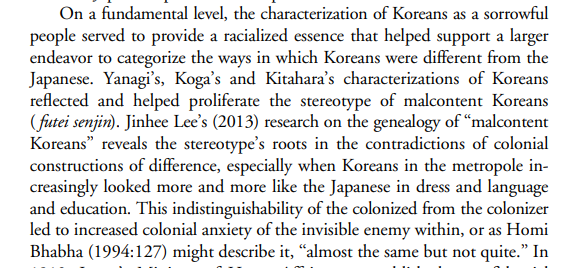PSA
Stop using "the uniquely Korean concept of Han" to explain Korea. "Han" (恨) as a concept did exist in pre-modern times, but it was first popularized as a way to essentialize Koreans as a "sad and primitive people" by Japanese "Korea expert" Yanagi Muneyoshi in the 1910s.
Stop using "the uniquely Korean concept of Han" to explain Korea. "Han" (恨) as a concept did exist in pre-modern times, but it was first popularized as a way to essentialize Koreans as a "sad and primitive people" by Japanese "Korea expert" Yanagi Muneyoshi in the 1910s.
Yanagi's characterization initially began with his interest in Korean pottery, but was quickly adopted by other Japanese writers to explain away anything else they observed about Korea. Han's popularization thus first occurred in a colonial context.
The concept would be rediscovered and repurposed by Korean writers and cultural scholars in the 70s-80s in their efforts to define or reconnect to a unique, cultural "Korean-ness" after many decades of colonial occupation, war, and industrial development.
It may be a useful term for describing the deep grief and sense of loss articulated in many works of literature and art, especially those that portray periods of war, division, and tragedy, but it is reductive to attempt to explain any and all Korean culture through this lens.
Screenshot source: https://core.ac.uk/download/pdf/147828545.pdf
I must note, many Koreans are also quick to use the concept, and are unaware of the history of the term. I don't want to invalidate anyone who finds the term resonant, but I am deeply skeptical of any cultural readings that are predicated on "han" being uniquely Korean.

 Read on Twitter
Read on Twitter


